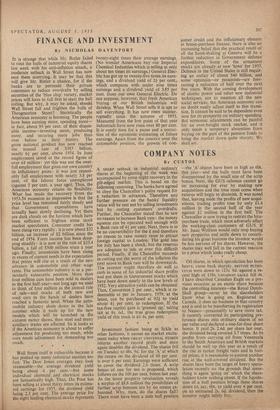COMPANY NOTES
By CUSTOS
A SHARP setback in industrial ordinary shares at the beginning of the week was accompanied by some slight recovery in the gilt-edged market. This is based on the following reasoning. The banks have agreed to obey the Chancellor's polite request for a reduction in advances. Therefore any fUrther pressure on the banks' liquidity ratios will be met not by selling investments but by cutting customers' overdrafts. Further, the Chancellor stated that he saw no reason to increase Bank rate: the money squeeze can be operated well enough with a Bank rate of 44 per cent. Next, there is to be no convertibility for the £ and therefore no reason to raise money rates to attract foreign capital to London. The gold loss for July has been a shock, but the reserves are adequate to tide us over this difficult period. Finally, if the Chancellor succeeds in cutting out the worst of the inflation the next move in Bank rate will be downwards. The investor might therefore do well to cash in some of his industrial share profits and put them in Government stocks which have been down nearly to the low levels of 1952. Very attractive yields can be obtained. Thus, Conversion 2 per cent., which is re- deemable at par in January, 1959, at the latest, can be purchased at 924. to yield about 44 per cent. to redemption. If the tax-free capital gain is 'grossed up,' taking tax at 8s. 6d., the true gross redemption yield of this stock is £6 4s. per cent.
* * *
Investment fashion being as fickle as other fashions, \ it causes no market excite- ment today when GREAT UNIVERSAL STORES returns another record profit and once again doubles the dividend. The shares fell on Tuesday to 48s. 9d. for the 'A' at which the return on the dividend of 60 per cent. is over 6 per cent. Earnings were sufficient to cover the dividend 2.6 times. A scrip ' bonus of one for ten is proposed, which follows on the 100 per cent. bonus last year. As the latest property revaluation reveals a surplus of £8.8 million the possibilities of further scrip bonuses are by no means ex- hausted. Why, then, do the shares fall? There must have been a stale bull position —the 'A' ,shares have been as high as 60s. this year—and the bulls must have been disappointed by the small size of the scrip bonus. Next, the GUS colossus cannot go on increasing for ever by making new acquisitions and the time must come when returns will begin to diminish. It was noted that, leaving aside the profits of new acqui- sitions, trading profits rose by only £1.4 million in the second half of the year against £2 million in the first half. The Chancellor is now trying to restrict the hire- purchase trade, which must adversely affect the working-class customers of GUS. If Mr. Isaac Wolfson would only stop buying new properties and settle down to consoli- dating his great business the investor would be less nervous of his shares. However, the shares may well fall in the current reaction to a price which looks really cheap. * * * Oil shares, in which speculation has been heavy, came back sharply. BRITISH PETRO- LEUM were down to 123s. 9d. against a re- cent high of 138s. CANADIAN EAGLE fell 4s. I have described Canadian Eagle on a pre- vious occasion as an exotic share because the controlling interests—the Royal Dutch- Shell group—never let the shareholders know what is going on. Registered in Canada, it does no business in that country and is said to be transferring its registration to Nassau—presumably to save more tax. It recently converted its participating pre- ference shares into ordinary shares of no par value and declared a one-for-four share bonus. It paid 2s. 2.4d. per share last year, the dividend being covered 3.7 times. As its profits from carrying oil from Venezuela to the South American and British markets should be well up this year as a result of the rise in tanker freight rates and in fuel- oil prices, it is reasonable to assume another rise in the well-covered dividend. But the shares have been the target of heavy specu- lation recently on the grounds that some- thing is again 'going on' which the share- holders know nothing about. If the liquida- tion of a bull position brings these shares down to, say, 60s. to yield over 4 per cent. On an estimated 2s. 6d. dividend, then the investor might safely buy.


































 Previous page
Previous page